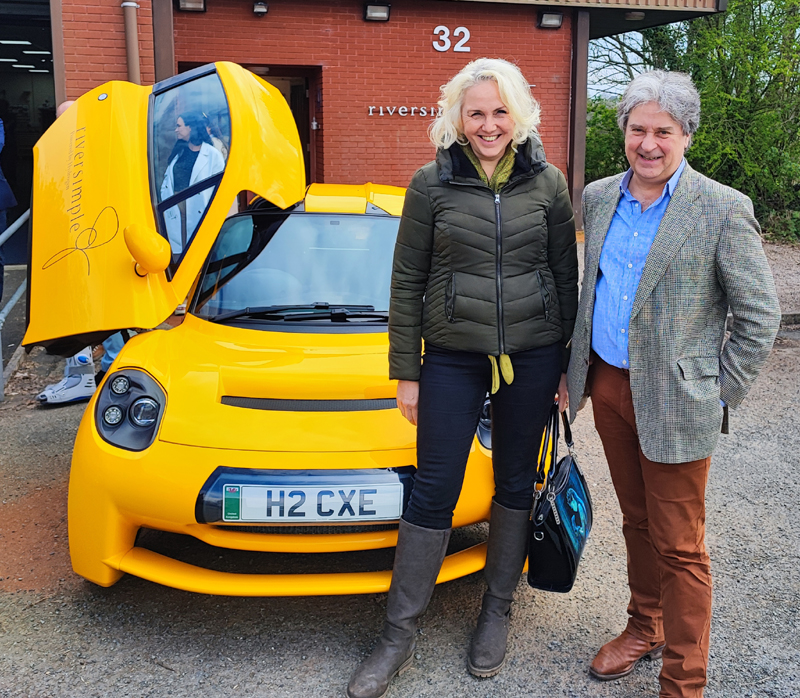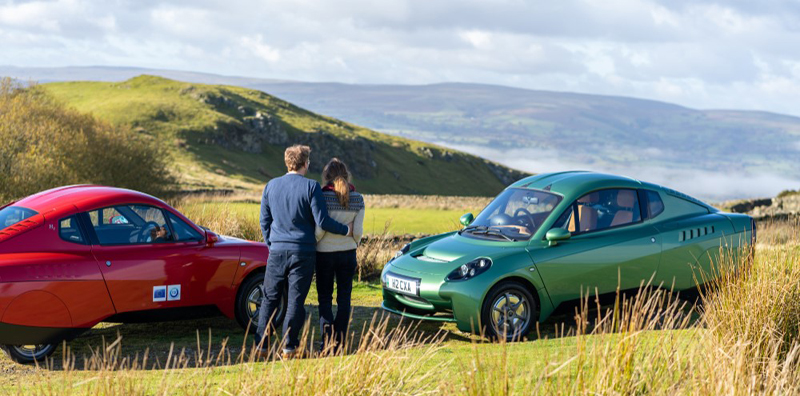CARS OF THE FUTURE
Will batteries or hydrogen fuel cells win the race to power the cars of our near future?
According to Hugo Spowers, that’s the wrong question to be asking.
Hugo is founder of Riversimple, a Wales-based company developing a new hydrogen fuel cell powered car. It’s not a petrol car that he’s adapting to take hydrogen, it’s a completely new design, started from a blank sheet of paper. And it looks gorgeous.
Hugo believes that it is not a case of either or, but rather of both, but each in the right place. We shouldn’t be putting all our emphasis on electric cars, but rather we should look longer term and consider how hydrogen fuel cells can fit into the future of personal transportation.
Although there is a big push towards electric vehicles, this does come with a few challenges; the raw materials needed to create batteries are often difficult to mine, found in places where environmental and social considerations are not a top priority, they can be polluting, and, of course, they are finite. If we’re to replace all 3billion cars in the world with electric vehicles (EVs) we’ll need a lot of these raw materials. And then there is the issue of the end of life of the batteries.
In addition, the range of an EV is still limited and although the same can be said for a petrol or diesel car, it takes just minutes to fill up with fuel, but can take much, much longer to charge your car – assuming you can find a suitable charging point. If you want more range, you need more batteries, but if you add more batteries, you increase the weight of the car which, in turn, decreases the range… you see the problem.
Hydrogen fuel cells therefore have quite a few advantages over batteries. They do not require the same amount or types of environmentally questionable raw materials, they can be topped up in the same way you fill up with petrol (i.e., via a pump on a forecourt), and the vehicles have far fewer moving parts (no huge engine or exhaust, for example) so there is much less to go wrong and the car itself is lighter – increasing the range still further.
All this makes hydrogen fuel cells well worth putting into the mix when designing the cars we’ll be driving in the next decade.
But for Riversimple, it doesn’t stop there. Currently a car manufacturer has no incentive to make its cars more fuel efficient. It costs more to increase fuel efficiency and most consumers will not pay extra for savings they might make in the future.
To illustrate this, take a look at the VW Beetle. The fuel efficiency of the car has hardly changed since its debut in 1938. If the manufacturer was motivated to increase fuel efficiency, I am pretty sure they could have done it. But why spend money on something consumers won’t pay for?
Then there is the longevity of the car and associated maintenance costs. As the manufacturer passes all this to us when we buy the car, they are not interested in making the car last for years or need very little maintenance. In fact, the opposite is true. They want us to have to buy spare parts and get our cars repaired (as they make money from this), and they don’t want the cars to last too long as they want us to buy another new one sooner rather than later. This isn’t good for us or the planet.
So, Hugo decided to look at a different business model; one where the manufacturer keeps ownership of the car. Think of it this way; you pay for the car on a monthly basis and the fee you pay includes the car, all maintenance and repairs, all fuel, the MOT, insurance etc., So the single fee you pay covers everything – no extras, and no nasty surprises. When you decide you want a new car, the manufacturer takes your old one and ‘leases’ it, in the same way, to a new customer who is looking for a second hand (and therefore cheaper) car. This way the manufacturer is motivated to ensure the car requires little maintenance, is reliable and doesn’t constantly require repairs, and is very fuel efficient. By improving all these aspects, their profit margins increase. This is a triple win; good for us (no costly bills and a super-reliable car, no matter its age), good for the environment (cars that last longer and don’t need lost of new parts), and good for the company as it has a solid business model with a guaranteed income.
The Riversimple cars are about three years away from being available to the mass market, but you can ‘hire’ them right now if you fancy trying one out. They look stunning and with a range of elegant and fun colours to choose from you’ll be turning heads for all the right reasons!
FACTBOX
For more information about Riversimple see: riversimple.com
The visit to Riversimple was arranged by the IoD. To become a member visit: iod.com/locations/wales
ABOUT THE AUTHOR
Chantal Cooke is an award-winning environmental journalist, founder of PASSION for the PLANET, the UK’s first environmentally focused radio station, and boutique PR agency, Panpathic Communications Ltd



